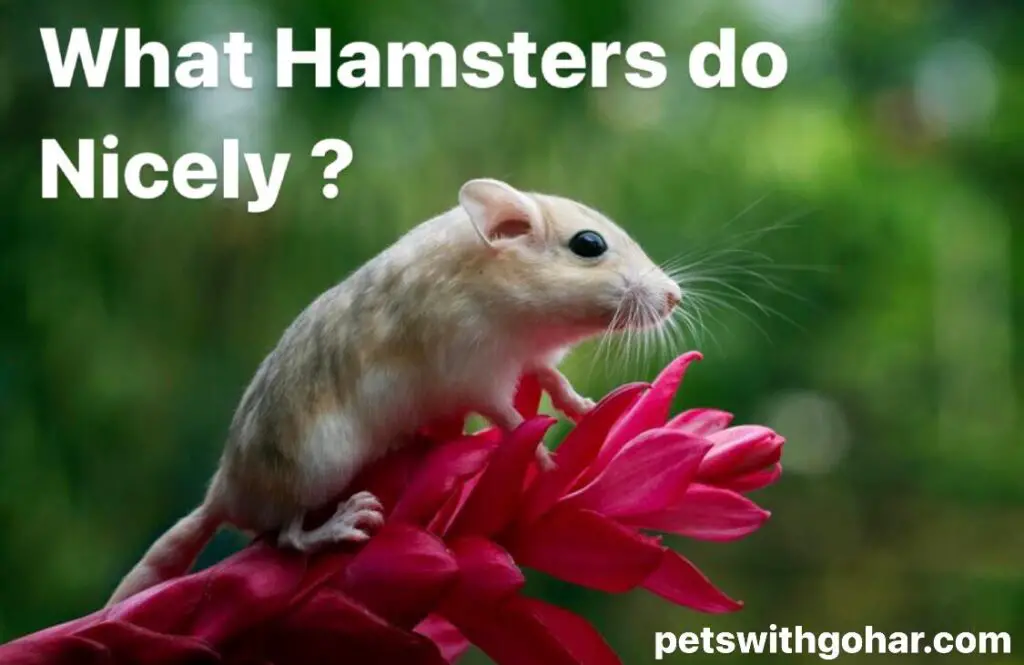More and more people choose to keep little, fluffy hamsters as pets. Weighing the Pros and Cons of Hamsters as Pets into your home is essential before you jump at the chance to have a tiny, cuddly friend. Pet lovers adore them for their cuteness and diminutive stature. On the other hand, hamsters have their benefits and drawbacks, just like any other pet.
The list of benefits to owning a pet hamster is long. Because of their amiability, low cost, and minimal care requirements, hamsters make great pets for people of all ages. While we’ll get into the benefits of having hamsters, it’s important to be aware of and prepared for the possible difficulties.
Pros and Cons of Hamsters as Pets
Pros
- Easy to Maintain:
- Designed and Floor Area Needed:
- Reasonable price:
- Having Fun and Being With Someone:
- Zero Worries About Allergies:
- Endearing Visual Appeal:
- Advantages for Health:
Cons
- Limited Duration:
- Nighttime Conduct:
- Minimal Communication:
- Possible Health Risks:
- Aggression Possibility:
- Being Alone:
- Difficulty in Training:

Some Important Pros Hamsters as Pets
Minimal Upkeep
Hamsters are known for their low upkeep. Instead of needing constant care, hamsters are independent. They entertain themselves and need little grooming.
Small space needs
Hamsters are ideal for small spaces. They don’t need a large space to live comfortably. A small cage can accommodate them well.
Affordability
Hamsters are cheaper than larger pets. Families on a budget should consider them because their food and housing are cheap.
Fun and companionship
Hamsters are funny despite their size. Your home can be filled with laughter from their antics, especially during active hours. Though less social than larger pets, they provide companionship.
Free of Allergies
Hamsters are ideal for pet dander allergy sufferers. Their fur is less allergenic, making them suitable for allergy-prone households.
Suited for apartments
Hamsters are ideal apartment pets due to their small size and low noise. Their compact habitat fits into small living spaces and won’t disturb neighbors.
Great for Pet First-Time Owners
Hamsters are great pets for beginners. Their easy care and needs make them a good first pet for families or individuals.
Educational for Kids
Keeping a hamster can teach kids. As they care for and understand a living creature, they learn responsibility and empathy.
Therapeutic Benefits
Hamsters can be therapeutic to watch. Owners can relax with their calm presence and funny antics.
Cute Looks
Don’t forget hamsters’ cuteness. Their cute, round bodies, fluffy fur, and adorable eyes make them irresistible, bringing their owners daily joy.
Stay still
Hamsters are great pets for people who live in apartments or just want an animal that won’t disrupt their peace.
Entertaining
Hamsters are entertaining animals because of their energy and curiosity, which they display through running on a wheel or investigating their environment.
Creating a bond
Hamsters may not be very cuddly, yet they nonetheless develop strong relationships with their owners via kind handling and play.
Relevance to Education
Kids can learn a lot by caring for a hamster, including how to be responsible, empathic, and aware of the animal kingdom’s typical habits.
Hamsters have many benefits as pets. From their low maintenance to their affordability and entertaining personalities, hamsters make great pets for families and individuals.
As we discuss the pros, we must also consider the drawbacks of hamster ownership.
Cons of Hamsters as Pets
Hamsters are cute and fun, but there are some drawbacks to owning one. Consider these cons:
Short Life span
Short lifespans are a drawback of hamster ownership. Hamsters live 2–3 years on average. This may be difficult for long-term pet owners.
Nighttime Behavior
Nighttime is when hamsters are most active. Owners who prefer daytime interaction may not like this. A harmonious relationship may require scheduling adjustments.
Limited Interaction
Hamsters interact less with their owners than dogs and cats. They recognize and bond with their caregivers but may not need constant attention. This may disappoint interactive pet lovers.
Risky for Young Children
Hamsters may not be ideal for young families. Due to their fragility, children may accidentally mishandle them. Supervision is essential to protect the child and hamster.
Possible Aggression
If threatened, some hamsters can be territorial or aggressive. This may make it hard for pet owners to build trust and handle safely.
Aloneness
Hamsters prefer solitude and may not do well in groups. Housing multiple hamsters can cause territorial disputes and fights.
Challenge to Train
Unlike dogs, hamsters are hard to train. Teaching them tricks or commands takes patience and persistence, but results may be limited.
Noisy at Night
Hamsters are noisy at night. If the hamster’s cage is in the bedroom, noise-sensitive owners may have trouble sleeping.
Potential odor
Hamster cages must be cleaned regularly to avoid odors. Without proper care, their waste and bedding can smell.
These issues must be considered by prospective hamster owners. Hamsters can be great pets, but knowing the cons helps you understand their responsibilities and drawbacks.

Is there anything that hamsters do that is pleasant?
Despite their diminutive stature, hamsters make wonderful pets due to their sociable nature and array of cute antics. A few endearing things hamsters do well are:
Stuffing Chops
The charming behavior of stuffing one’s cheeks with food is a hallmark of hamsters. Their adorable and charming behavior is on full display as they bring a seemingly endless supply of goodies to their nest.
How to Nest
The ability to build elaborate and comfortable nests out of bedding materials is an amazing trait in hamsters. One of the most charming things about having hamsters as pets is watching them work so hard to make a cozy nest.
Beauty Routines
The little paws of a hamster are used for the delicate task of brushing the animal’s fur. In addition to keeping them clean, this self-care routine is visually appealing.
Intriguing Investigation
As rodents, hamsters are inherently inquisitive. They are full of energy and enthusiasm as they investigate their surroundings, finding new things in every corner. Their natural habitat navigation is charming and entertaining to watch.
Adorable Ways to Sleep
Hamsters’ cute sleeping positions are well-known. Their sleeping positions, whether they’re curled up in a small ball or stretched out in a relaxed way, never fail to be adorable.
The Process of Wheel Running
Running, particularly on their exercise wheels, is something hamsters love to do. It is essential for a hamster’s physical health, and it is also entertaining, to watch them run around in their wheel.
Digging and Caving
The burrowing and tunneling behavior is a favorite pastime of hamsters. Hamsters enrich their environment and provide entertainment for their owners when they build tunnels or hiding places to act out their natural behaviors.
Delicate Bites
When playing, hamsters gently nibble on treats or use their mouths to explore. Their gentle habits while eating are charming and adorable.
Expressions on the Face
Hamsters are capable of showing a wide range of emotions, even though they have relatively small faces. They have a wide range of facial expressions that owners find endearing, from inquisitive sniffs to little squeaks.
Having Fun with Playthings
Hamsters can be entertained for hours by playing with anything from basic cardboard tubes to elaborate constructions. Their inquisitive minds and playful nature are on full display in the way they engage with toys.
Love at First Sight
Hamsters aren’t usually thought of as snuggly pets, but when handled gently, some of them do act more relaxed. Though fleeting, these cuddly moments can bring immense joy to their owners.
Hamsters, in a nutshell, are delightful pets that enrich the lives of their owners via a variety of endearing actions. These little animals have a way of making people laugh and smile, whether it’s through playful antics or cheek stuffing.
Conclusion
Hamsters bring a lot to homes, including personality, entertainment, and company. However, before taking on the responsibility of caring for these adorable but diminutive rodents, would-be owners should think about what they’re getting themselves into.
Those lucky enough to have hamsters as pets can enrich their lives with boundless happiness and joy when given the care and attention they need.
FAQs of Pros and Cons of Hamsters as Pets
Q: Can kids safely keep hamsters as pets?
A: Although hamsters can be a good fit for families with kids, it’s important to keep an eye on them and teach them proper care so they can live long healthy lives.
Q: Are hamsters able to spend the day unattended?
A: Yes, hamsters can spend the daytime alone since they are nocturnal. Give them something interesting to do when they’re alone at night.
Q: Is specialized veterinary care necessary for hamsters?
A: Hamsters should see a vet regularly so that any problems can be caught early.
Q: When you own hamsters, what are the most difficult things about it?
A: Their brief life expectancy, nocturnal habits, lack of social interaction, and possible health issues should be carefully considered by owners.
Q: Are hamsters social creatures that can coexist?
A: Because of their solitary nature, hamsters might not do well in social settings. When you try to keep hamsters in the same cage, territorial disputes and fights are possible outcomes.
Q: What makes hamsters squeak at night?
A: When hamsters are active at night, they can make a lot of noise. If the hamster’s cage is in the bedroom, it might be difficult for owners who are sensitive to noise to sleep.
For anyone thinking about getting a hamster as a pet, these frequently asked questions should help clear up some of the more common questions and concerns.
